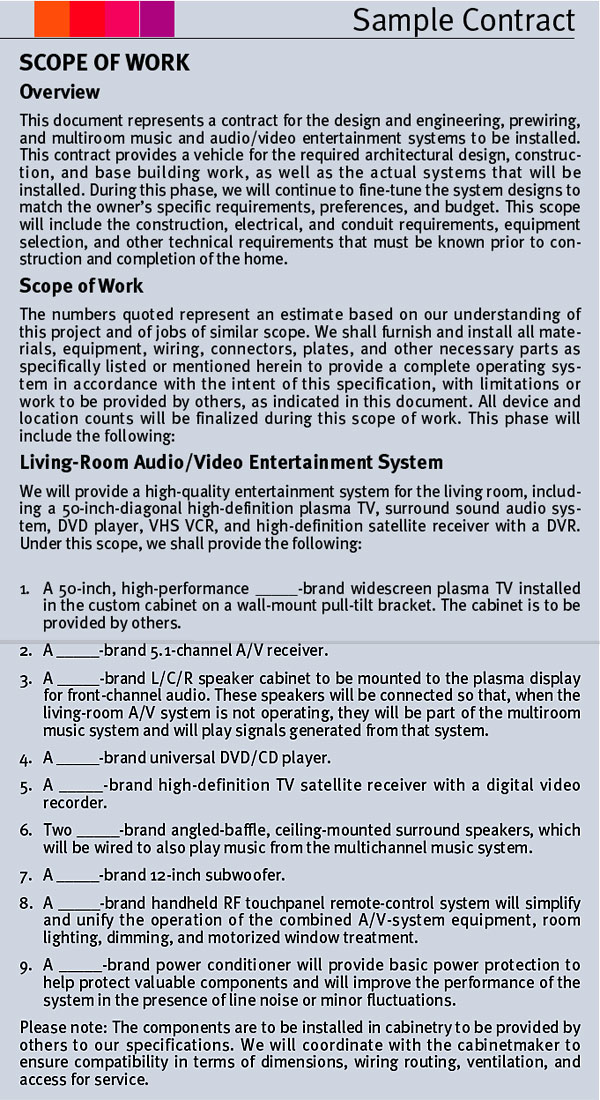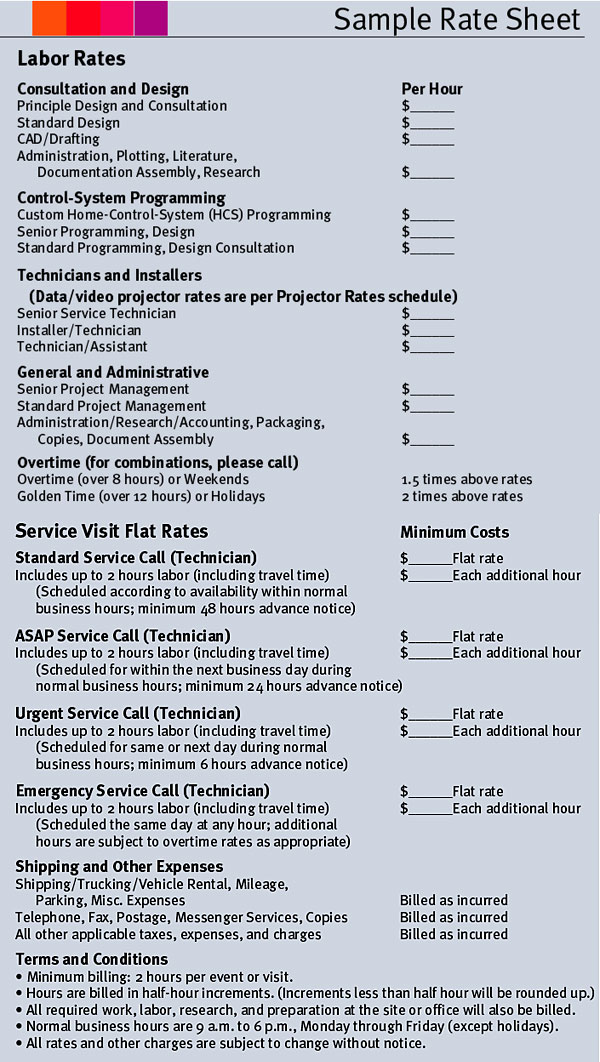Manage Your Installer
 Questions to ask before you sign on the dotted line.
Questions to ask before you sign on the dotted line.
I consider myself an experienced gardener. But I recently came across a situation that was just too much, even for my green thumb. Five men and two days later, I realized I just didn't have the expertise to conquer a particularly troublesome planter. I knew when I was licked. Face it; you may encounter things in life that are just beyond your abilities. Not that you couldn't do a yeoman's job installing a home theater, but you might not have the tools, time, or experience. If you find yourself in such a situation, this article and sample contracts should provide some guidelines that will help guarantee a happy result.
I've found that the majority of installer/integrators are credible and reliable. The ones who belong to national trade organizations take themselves seriously. Yet, in many ways, this fledgling industry is still like the Wild West. Almost anyone with a business card and a tool belt can put up a shingle and call him- or herself an installer.
Clear Statement of Scope
Assuming you've done your research and selected your installer wisely, you should ask for a written proposal that defines the specific work to be done—before it begins. A one-line bid ("install plasma/surround system") is insufficient. A credible installation company will provide a plain-English, detailed description and an equipment list with the brand, model number, quantity, and price for each item. Make sure that the bid spells out any additional work you need, such as removal of your old TV. The bid should contain ample details regarding the mounting of components and their interoperability. Is there anything that is unclear or vague? For example, do you want the installer to provide a new HD dish antenna? If so, how do they plan to address the video distribution to other TV locations? If you just don't want to be bothered with the details, make sure you hold your general contractor liable for all work the installer performs. Don't withhold your expectations and assume that all parties know what you want. Otherwise, you may be unpleasantly surprised.
Work Required by Others
The CE installation industry is a relative newcomer among established trades, and some installers don't approve of rank interlopers. The best installer/integrators make sure the other professionals know their scope and that everyone's clear about which responsibilities belong to whom. Make sure you ask your installer what parts of the project the professionals from other trades will be working on: electrical, cabinets, roofing, ventilation, and so on. Is it all spelled out in the contract, or are you just expecting the installer to patch and paint the holes they may create in your walls? Is a designer, general contractor, or architect involved? How is the communication among all parties to be handled? Who is managing the project?
Training
There should be a tutorial session wherein your installer fully briefs and tests you on your new system's operation. Make sure the contract defines how much training time is included. You need to be able to operate your system easily. Can you understand and operate the remote control intuitively? Where are the owner's manuals for the components you purchased?
Service
It's not uncommon for some installers of lesser repute to avoid post-installation service calls. Custom installation is still a cottage industry, and, as it matures, we hope it fleshes out many of the elements that you might find already established in other trades, such as service. Your installer should include a dependable, written service policy in the proposal. What is their response time? Do they have a dedicated service department? What if you get a lemon? Don't leave things vague. All of the service terms should be written in the agreement. As a small-claims-court judge once told me, "A verbal contract isn't worth the paper it's printed on."
Warranty
What is the warranty period for the installation itself, not merely the individual product warranties? Get it in writing. Are you entitled to a replacement unit if you get a lemon, or are you doomed to continually send the same piece back for repair? Who pays for removal and reinstallation? Does the warranty period include programming of control systems? Do the providers offer extended service plans? If so, what are the fees, and how does the program work?
Labor Rate Sheet
When does the clock start ticking? You should know whether you'll be charged for an initial consultation. Are design and engineering included? What are the hourly rates for the various workers? How much do they charge for emergency service calls? What about overtime? Are these rates the industry standard in your area? (Check out our sample rate sheet on page 34.)
Documentation
Find out what paperwork the installer provides: schematics, labeled-box schedules for wire tracing, CAD drawings, schematics, manufacturers' product manuals, simple operation instructions, etc.
Terms of Payment
Check the contract. How much is due up front? Does the contract describe the labor as a time-and-materials estimate, or is it a hard number? Due to minor glitches, it's fairly common for the final wrap-up to be prolonged. The contract should allow you to withhold 10 percent of the total until the job is complete, the system is fully operational, and you are satisfied.
Insurance
With whom does the installer have insurance and for how much?
Get a Signature
It's all well and good for an installer to ask for your signature—on the check and on the contract. But where is his or her signature? What about your protection? If your installer is unwilling to sign an agreement, as they say in SoCal, Pass-adena.
Start and Finish Dates
Some installers deliberately avoid committing to a time frame because they claim they may be able to beat their anticipated start and finish dates. Well, that's fine. But, unless you have at least some indication of when the project will wrap up, you could be hung up for far too long.
Licensed?
In California, the method of currency is a C-7 or C-10 license. In most states, you can go online and confirm whether your chosen installer is licensed. Is it absolutely necessary? Well, it's a good indicator that your installer has been in business for a while and is committed.
So, you should be looking for complete transparency from your installer. Any hemming, hawing, or withholding of important information—or anything that makes you suspicious—should be a red flag. Get a second opinion if something seems fishy. The clearer your agreement is at the outset, the greater the odds of a successful project. If you have any personal horror stories or happy endings, we'd like to know.


























































